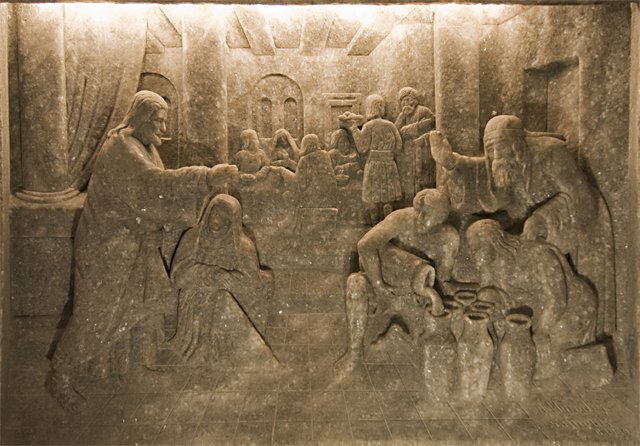Sermon: Saving the Best for Last

At this time of Epiphany, the church remembers and celebrates three moments in Jesus’ life in which his true nature became known to the world. The first of these, which we celebrate on January 6th at the Feast of the Epiphany, is the visit of the Magi — the wise men who followed the star and found the child who was born King of the Jews. Jesus’ kingship was made known to the world. The second event, which we celebrated last Sunday, is the baptism of Jesus — when the waters of the Jordan touched Our Lord’s body, a voice from the heavens declared “This is my son, the beloved. Jesus’ son-ship was made known to the world. And today we celebrate Jesus’ miracle at the wedding in Cana — Jesus shows his divine power over the natural world by changing water into wine. Jesus’ divinity was made known to the world.
Knowing the Nearness of God
The celebration of these epiphanies reminds us of one of the difficulties of the Christian life. In our hearts and minds, we all know that God is very close to each one of us. Yet, as we go about our daily lives, we are often unable to see how God is present in our lives. We all need to have our own epiphanies — those moments when we realize that God is with us now — to help us understand how God’s love and power and grace are working in our own lives. We need to have our own epiphanies on a regular basis so that we remember our closeness to God.
Jesus’ miracle of changing water into wine was an important moment for his disciples. Before this event, they followed Jesus — they answered his call, and they undoubtedly respected and admired him as a teacher and a prophet and a leader. But when they saw Jesus’ glory revealed in this miracle, the gospel tells us that they believed in him. The disciples may be a little bit slow, but at this moment they started to see and understand Jesus as more than just a teacher, more than just a prophet, more than just a leader. They began to see him as the Son of God.
A Small Miracle: Be on the Lookout
And just as Jesus’ nature is revealed to the disciples in this miracle, so we too can understand a little bit more about how God operates by studying this miracle story carefully. And the first thing we notice here is that Jesus’ first miracle is … a small miracle. Don’t get me wrong, changing water into wine is clearly an impressive feat. But Jesus would go on to do many more miracles that were more astonishing: healing the sick without medicine, casting out demons, walking on water, and raising the dead to life. Those are some serious miracles.
Today’s miracle is on a much smaller scale. Many people miss it; the servants knew what happened, and the disciples and Jesus’ mother also knew, but the steward and the wedding guests only got part of the story. They noticed the excellent wine that Jesus provided, but they did not stop to wonder why they had been so blessed.
It is human nature to accept all of the good things of this world as our due: we deserve the best, and we are more than happy to attribute our blessings to our own hard work, intelligence, charm, and good luck. And when difficult times come, we cry out, wondering why God does not take a more active role in our lives. But if we stop and reflect, and look back on all of the blessings that we didn’t notice, and all the hardships that we escaped, we might just begin to see God’s work in our lives.
A Small Miracle: Keeping the Party Going
Another telling detail in this story can be found when we look at the role that Mary, Jesus’ mother, plays. She notices that there is a need, and she asks Jesus to address that need. Mary is giving us the example of intercessory prayer. Mary is paying attention to what is happening at this wedding party, and she notices that there is trouble — and she takes that trouble to Jesus. Note that she doesn’t tell Jesus what to do; she doesn’t demand a specific action, nor does she offer a preferred solution. She simply raises the human need to her son. And she has complete and total faith that he will come through with the best solution, as she calmly tells the servants, “Do whatever he tells you.”
What a fine example of prayer! Mary understood that God is deeply concerned with our human affairs. In our gospels, we often see Jesus’ attention to human needs, as he provides food and healing and comfort to those who are in want. Mary knows this about her son, and we should know it, too. This story teaches us to raise our concerns to God, and to rely on God to make a way, even where we see none. It is the prayer of Mary that keeps the party going.
A Small Miracle: Saving the Best for Last
I think that this miracle has one more important truth to teach us. I find myself intrigued by the astonishment of the steward: “you have kept the good wine until now.” The steward thinks that this is the bridegroom’s doing, but really, it is Jesus who saved the best for last here. And saving the best for last is a good way of describing how God works in our lives. While our culture values youth and freshness and finds little value in age and wisdom, God continually pours blessings on the entirety of our lives.
Throughout our lives, we go through times of transition where our current identity is no longer suitable. The young child has to leave the life of play and start going to school. The college student must graduate and enter the workforce. And when older workers retire, they often ask, what next? Parents, too, have to face the ever-shifting definition of parenthood as their own children grow up, leave the home, and start their own lives. Our lives are full of moments of transition, and at these times we cannot help but wonder: are the best years of my life behind me?
Today’s miracle gives us hope that the best years of our lives are never behind us. God’s mercies are new every day, and each one of life’s transitions, however painful they may be, open the door to new experiences. Experiences that can be exciting, and sometimes terrifying, but always, in the end, rewarding.
And even death, that final and most fearsome transition, is for us the gate to everlasting life.
Truly, our God really does save the best for last.
Noticing our Epiphanies
The closer we look at this small miracle, the bigger it begins to seem. It is the mystery and paradox of God, who reigns from heaven above and has sway over the whole universe; and yet who is also as close to us as a loving parent, gently guiding us along our path.
God will be present with us, even if we never take notice of God’s presence or actions in our lives. But as Christians, we are called to pay attention to God’s presence in this world. We are called to testify to the good things that we have received from God, and we cannot do that if we don’t discern the blessings that God bestows upon us.
So let us be on the lookout for our own little epiphanies. We need not wait for divine visions, or awesome deeds of power, or miraculous healings. We can start by reflecting on all of the good things that we have received from God. We can start by looking around us — at our families, our church, and our communities — and seeing how the hand of God has been at work in forming them to be what they are today. And we can start by developing the habits of prayer and thankfulness — bringing our troubles and concerns to God and offering thanks for the gifts that we receive.
God is always with us, each one of us. May we be blessed with the knowledge of God’s presence in our lives.


